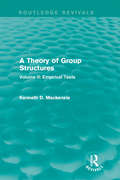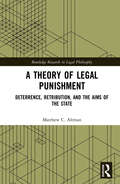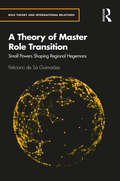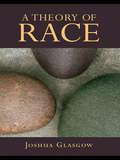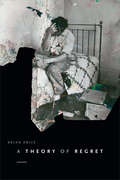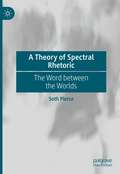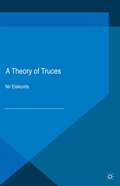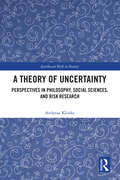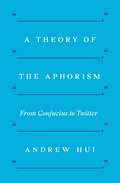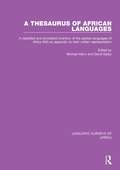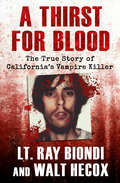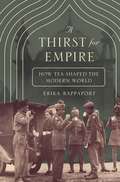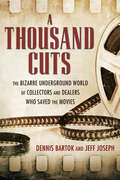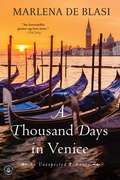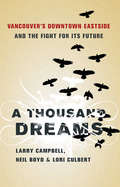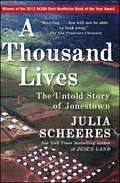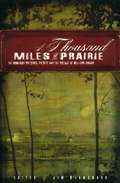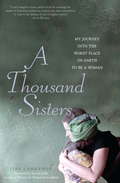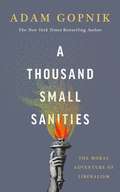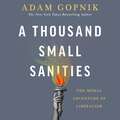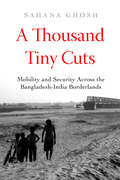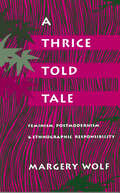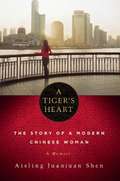- Table View
- List View
A Theory of Group Structures: Volume II: Empirical Tests
by Kenneth D. MackenzieFirst published in 1976, this A Theory of Group Structures is a study of the aggregation of individuals into groups, which cuts across many different social sciences. Volume two examines a sequence of twelve experiments and reports empirical tests of the theory presented in volume one. The result is a major revision of existing research into problems of group structure and a case study in paradigm development. This book will be of interest to students of all social sciences.
A Theory of Legal Punishment: Deterrence, Retribution, and the Aims of the State (Routledge Research in Legal Philosophy)
by Matthew C. AltmanThis book argues for a mixed theory of legal punishment that treats both crime reduction and retribution as important aims of the state. A central question in the philosophy of law is why the state’s punishment of its own citizens is justified. Traditionally, two theories of punishment have dominated the field: consequentialism and retributivism. According to consequentialism, punishment is justified when it maximizes positive outcomes. According to retributivism, criminals should be punished because they deserve it. This book recognizes the strength of both positions. According to the two-tiered model, the institution of punishment and statutory penalties, as set by the legislature, are justified based on their costs and benefits, in terms of deterrence and rehabilitation. The law exists to preserve the public order. Criminal courts, by contrast, determine who is punished and how much based on what offenders deserve. The courts express the community’s collective sense of resentment at being wronged. This book supports the two-tiered model by showing that it accords with our moral intuitions, commonly held (compatibilist) theories of freedom, and assumptions about how the extent of our knowledge affects our obligations. It engages classic and contemporary work in the philosophy of law and explains the theory’s advantages over competing approaches from retributivists and other mixed theorists. The book also defends consequentialism against a longstanding objection that the social sciences give us little guidance regarding which policies to adopt. Drawing on recent criminological research, the two-tiered model can help us to address some of our most pressing social issues, including the death penalty, drug policy, and mass incarceration. This book will be of interest to philosophers, legal scholars, policymakers, and social scientists, especially criminologists, economists, and political scientists.
A Theory of Master Role Transition: Small Powers Shaping Regional Hegemons (Role Theory and International Relations)
by Feliciano de Sá GuimarãesIn this book, Feliciano de Sá Guimarães offers an original application of Role Theory. He proposes a theory of master role transitions to explain how small powers can change regional powers’ master roles without changing the regional material power distribution.Master role transition is the replacement of an active dominant master role by a dormant or inactive role located within one’s role repertoire. Guimarães argues that only a combination of four necessary conditions can produce a full master role transition: asymmetrical material interdependence, altercasting, domestic contestation and regional contestation. In each one of these conditions, a small power uses material and ideational tools to promote a master role transition within the regional power role repertoire. To test his model, Guimarães turns to five case studies in Latin America, Southern Africa and South Asia: the 2006–2007 Bolivia–Brazil gas crisis, the 2008–2009 Paraguay–Brazil Itaipú Dam crisis, the 2008–2009 Ecuador–Brazil Odebrecht crisis, the 1998 South Africa–Lesotho military intervention crisis and the 1996India–Bangladesh Ganges water crisis.A Theory of Master Role Transition is an excellent resource for those studying both theory and method in International Relations and foreign policy analysis.
A Theory of Race
by Joshua GlasgowSocial commentators have long asked whether racial categories should be conserved or eliminated from our practices, discourse, institutions, and perhaps even private thoughts. In A Theory of Race, Joshua Glasgow argues that this set of choices unnecessarily presents us with too few options. Using both traditional philosophical tools and recent psychological research to investigate folk understandings of race, Glasgow argues that, as ordinarily conceived, race is an illusion. However, our pressing need to speak to and make sense of social life requires that we employ something like racial discourse. These competing pressures, Glasgow maintains, ultimately require us to stop conceptualizing race as something biological, and instead understand it as an entirely social phenomenon.
A Theory of Regret
by Brian PriceIn A Theory of Regret Brian Price contends that regret is better understood as an important political emotion than as a form of weakness. Price shows how regret allows us to see that our convictions are more often the products of our perceptual habits than the authentic signs of moral courage that we more regularly take them to be. Regret teaches us to give up our expectations of what we think should or might occur in the future, and also the idea that what we think we should do will always be the right thing to do. Understood instead as a mode of thoughtfulness, regret helps us to clarify our will in relation to the decisions we make within institutional forms of existence. Considering regret in relation to emancipatory theories of thinking, Price shows how the unconditionally transformative nature of this emotion helps us become more sensitive to contingency and allows us, in turn, to recognize the steps we can take toward changing the institutions that shape our lives.
A Theory of Spectral Rhetoric: The Word between the Worlds
by Seth PierceThis book synthesizes Jacques Derrida’s hauntology and spectrality with affect theory, in order to create a rhetorical framework analyzing the felt absences and hauntings of written and oral texts. The book opens with a history of hauntology, spectrality, and affect theory and how each of those ideas have been applied. The book then moves into discussing the unique elements of the rhetorical framework known as the rhetorrectional situation. Three case studies taken from the Christian tradition, serve to demonstrate how spectral rhetoric works. The first is fictional, C.S. Lewis ’The Great Divorce. The second is non-fiction, Tim Jennings ’The God Shaped Brain. The final one is taken from homiletics, Bishop Michael Curry’s royal wedding 2018 sermon. After the case studies conclusion offers the reader a summary and ideas future applications for spectral rhetoric.
A Theory of Truces (Palgrave Studies in Ethics and Public Policy)
by Nir EisikovitsThis book argues that understanding truces is crucial for our ability to wind down wars. We have paid too much attention to the idea of permanent peace, yet few conflicts end in this way. The book describes how truce makers think, which truces can be morally justified and provides a philosophical history of truce making in the Western tradition.
A Theory of Uncertainty: Perspectives in Philosophy, Social Sciences, and Risk Research (Earthscan Risk in Society)
by Andreas KlinkeUsing sources from classical to modern that broach the phenomenon of uncertainty and its relation to risk, this book creates a novel approach to the recognized but theoretically often unattended issue of uncertainty.Andreas Klinke develops a new, general theory of uncertainty that provides a taxonomy of categories which are deduced from a critical inventory in philosophy, social and natural sciences, and risk research. Comprising six parts, the philosophical grounding of uncertainty sets the stage for the following philosophical and social scientific accounts and explanation of four distinctive guises of uncertainty that form a taxonomic notion and rationale: ontological, epistemological, linguistic-communicative, and teleological uncertainty. The theoretical-conceptual rumination provides a complex, differentiated view of the anatomy of uncertainty and an understanding that can be used in further theoretical and empirical research, as well as socio-political practice. The latter is delineated in the final part addressing the societal domestication of uncertainty.This book will be of great interest to scholars and students in philosophy, social and natural sciences, risk research, as well as inter- and transdisciplinary science fields.
A Theory of the Aphorism: From Confucius to Twitter
by Andrew HuiAn engaging look at the aphorism, the shortest literary form, across time, languages, and culturesAphorisms—or philosophical short sayings—appear everywhere, from Confucius to Twitter, the Buddha to the Bible, Heraclitus to Nietzsche. Yet despite this ubiquity, the aphorism is the least studied literary form. What are its origins? How did it develop? How do religious or philosophical movements arise from the enigmatic sayings of charismatic leaders? And why do some of our most celebrated modern philosophers use aphoristic fragments to convey their deepest ideas? In A Theory of the Aphorism, Andrew Hui crisscrosses histories and cultures to answer these questions and more.With clarity and precision, Hui demonstrates how aphorisms—ranging from China, Greece, and biblical antiquity to the European Renaissance and nineteenth century—encompass sweeping and urgent programs of thought. Constructed as literary fragments, aphorisms open new lines of inquiry and horizons of interpretation. In this way, aphorisms have functioned as ancestors, allies, or antagonists to grand systems of philosophy.Encompassing literature, philology, and philosophy, the history of the book and the history of reading, A Theory of the Aphorism invites us to reflect anew on what it means to think deeply about this pithiest of literary forms.
A Thesaurus of African Languages: A Classified and Annotated Inventory of the Spoken Languages of Africa With an Appendix on Their Written Representation (Linguistic Surveys of Africa #1)
by Michael Mann David DalbyOriginally published in 1987, this thesaurus is concerned with the spoken languages of Africa. Languages are grouped into a relatively large number of sets and subsets within which the relationship of languages to one another is locally apparent and uncontroversial. The volume presents the languages in classified order with notes on each language, their variant names and immediate classification, and reference to the sources consulted. One section offers an exhaustive list of the languages spoken as home languages by local communities in each state, together with details of languages widely used for inter-group communication, given official recognition, or used in education or the media. There are brief phonological analyses of a broad sample of some 20 African languages and a comprehensive bibliography and language index to the whole work
A Third University Is Possible (Forerunners: Ideas First)
by la papersonA Third University is Possible unravels the intimate relationship between the more than 200 US land grant institutions, American settler colonialism, and contemporary university expansion. Author la paperson cracks open uncanny connections between Indian boarding schools, Black education, and missionary schools in Kenya; and between the Department of Homeland Security and the University of California. Central to la paperson&’s discussion is the &“scyborg,&” a decolonizing agent of technological subversion.Drawing parallels to Third Cinema and Black filmmaking assemblages, A Third University is Possible ultimately presents new ways of using language to develop a framework for hotwiring university &“machines&” to the practical work of decolonization. Forerunners: Ideas First is a thought-in-process series of breakthrough digital publications. Written between fresh ideas and finished books, Forerunners draws on scholarly work initiated in notable blogs, social media, conference plenaries, journal articles, and the synergy of academic exchange. This is gray literature publishing: where intense thinking, change, and speculation take place in scholarship.
A Thirst for Blood: The True Story of California's Vampire Killer
by Walt Hecox Lt. Ray BiondiThe &“fast-paced&” inside story of the manhunt for bloodsucking serial killer Richard Chase (Publishers Weekly). Written by the case&’s lead homicide detective, this gripping true crime account details the killing spree of one of California&’s most gruesome murderers: Richard Chase, aka &“the Vampire of Sacramento.&” In January 1978, Sacramento police found the corpse of Teresa Wallin, a loving wife and soon-to-be mother. Veteran detective Lt. Ray Biondi immediately knew the case would be unlike anything he had ever seen before. The victim&’s body was deliberately disfigured in nightmarish ways, and evidence suggested the culprit had collected large volumes of her blood. In less than a month, a two-year-old boy was missing, and two men, another woman, and a five-year-old child dead, their bodies contorted, like Wallin&’s, to fulfill the killer&’s demented sexual desires, and—most disturbingly—his taste for human blood. Previously published as The Dracula Killer, A Thirst for Blood is a riveting report of the investigation, from eyewitness testimonies to the discovery of the crime scenes to Chase&’s interrogation. Lieutenant Biondi and his coauthor, Walt Hecox, provide an unflinching look at the &“vampire killer&” and the cunning police work that finally put an end to his reign of terror. The inspiration for Investigation Discovery&’s Lore: Deadly Obsession and episodes of CSI and Criminal Minds, Chase&’s crimes continue to haunt the world generations later.
A Thirst for Empire: How Tea Shaped the Modern World
by Erika RappaportHow the global tea industry influenced the international economy and the rise of mass consumerismTea has been one of the most popular commodities in the world. Over centuries, profits from its growth and sales funded wars and fueled colonization, and its cultivation brought about massive changes—in land use, labor systems, market practices, and social hierarchies—the effects of which are with us even today. A Thirst for Empire takes a vast and in depth historical look at how men and women—through the tea industry in Europe, Asia, North America, and Africa—transformed global tastes and habits and in the process created our modern consumer society.As Erika Rappaport shows, between the seventeenth and twentieth centuries the boundaries of the tea industry and the British Empire overlapped but were never identical, and she highlights the economic, political, and cultural forces that enabled the British Empire to dominate—but never entirely control—the worldwide production, trade, and consumption of tea. Rappaport delves into how Europeans adopted, appropriated, and altered Chinese tea culture to build a widespread demand for tea in Britain and other global markets and a plantation-based economy in South Asia and Africa. Tea was among the earliest colonial industries in which merchants, planters, promoters, and retailers used imperial resources to pay for global advertising and political lobbying. The commercial model that tea inspired still exists and is vital for understanding how politics and publicity influence the international economy.An expansive and original global history of imperial tea, A Thirst for Empire demonstrates the ways that this fluid and powerful enterprise helped shape the contemporary world.
A Thousand Cuts: The Bizarre Underground World of Collectors and Dealers Who Saved the Movies
by Dennis Bartok Jeff JosephA Thousand Cuts is a candid exploration of one of America's strangest and most quickly vanishing subcultures. It is about the death of physical film in the digital era and about a paranoid, secretive, eccentric, and sometimes obsessive group of film-mad collectors who made movies and their projection a private religion in the time before DVDs and Blu-rays. The book includes the stories of film historian/critic Leonard Maltin, TCM host Robert Osborne discussing Rock Hudson's secret 1970s film vault, RoboCop producer Jon Davison dropping acid and screening King Kong with Jefferson Airplane at the Fillmore East, and Academy Award-winning film historian Kevin Brownlow recounting his decades-long quest to restore the 1927 Napoleon. Other lesser-known but equally fascinating subjects include one-legged former Broadway dancer Tony Turano, who lives in a Norma Desmond-like world of decaying movie memories, and notorious film pirate Al Beardsley, one of the men responsible for putting O. J. Simpson behind bars. Authors Dennis Bartok and Jeff Joseph examine one of the least-known episodes in modern legal history: the FBI's and Justice Department's campaign to harass, intimidate, and arrest film dealers and collectors in the early 1970s. Many of those persecuted were gay men. Victims included Planet of the Apes star Roddy McDowall, who was arrested in 1974 for film collecting and forced to name names of fellow collectors, including Rock Hudson and Mel Tormé. A Thousand Cuts explores the obsessions of the colorful individuals who created their own screening rooms, spent vast sums, negotiated underground networks, and even risked legal jeopardy to pursue their passion for real, physical film.
A Thousand Days In Venice: An Unexpected Romance
by Marlena De BlasiFernando first sees Marlena across the Piazza San Marco and falls in love from afar. When he sees her again in a Venice a year later, he knows it is fate. He knows little English; she, a divorced American chef traveling through Italy, speaks only food-based Italian. Marlena thought she was done with romantic love, incapable of intimacy. Yet within months of their first meeting, she has quit her job, sold her house in St. Louis, kissed her two grown sons good-bye, and moved to Venice to marry "the stranger," as she calls Fernando. This deliciously satisfying memoir is filled with the foods and flavors of Italy and peppered with culinary observations and recipes. But the main course here is an enchanting true story about a woman who falls in love with both a man and a city, and finally finds the home she didn't even know she was missing.
A Thousand Dreams: Vancouver's Downtown Eastside and the Fight for Its Future
by Neil Boyd Larry Campbell Lori CulbertIn this mix of history, journalism, political analysis, and first-person accounts, former chief coroner and Vancouver mayor Larry Campbell, renowned criminologist Neil Boyd, and investigative journalist Lori Culbert, offer a portrait of one of North America's poorest, most drug-challenged neighbourhoods: Vancouver's Downtown Eastside.<P><P>A Thousand Dreams raises provocative questions about the challenges confronting not only Vancouver's Downtown Eastside but also all of North America's major cities and offers concrete, urgently needed solutions, including:Continued support for Insite, the safe injection siteDecriminalization of prostitution and drugsThe transfer of addiction services to the Health Ministry, allowing detox into the medical systemMore government-funded SROs and more affordable social housing
A Thousand Lives: The Untold Story of Hope, Deception, and Survival at Jonestown
by Julia ScheeresIn 1954, a pastor named Jim Jones opened a church in Indianapolis called Peoples Temple Full Gospel Church. He was a charismatic preacher with idealistic beliefs, and he quickly filled his pews with an audience eager to hear his sermons on social justice. As Jones’s behavior became erratic and his message more ominous, his followers leaned on each other to recapture the sense of equality that had drawn them to his church. But even as the congregation thrived, Jones made it increasingly difficult for members to leave. By the time Jones moved his congregation to a remote jungle in Guyana and the US government began to investigate allegations of abuse and false imprisonment in Jonestown, it was too late. A Thousand Lives is the story of Jonestown as it has never been told. New York Times bestselling author Julia Scheeres drew from tens of thousands of recently declassified FBI documents and audiotapes, as well as rare videos and interviews, to piece together an unprecedented and compelling history of the doomed camp, focusing on the people who lived there. The people who built Jonestown wanted to forge a better life for themselves and their children. In South America, however, they found themselves trapped in Jonestown and cut off from the outside world as their leader goaded them toward committing “revolutionary suicide” and deprived them of food, sleep, and hope. Vividly written and impossible to forget, A Thousand Lives is a story of blind loyalty and daring escapes, of corrupted ideals and senseless, haunting loss.
A Thousand Miles of Prairie: The Manitoba Historical Society and the History of Western Canada
by Jim BlanchardA Thousand Miles of Prairie is a fascinating look at Manitoba's early boom years (1880-1910) through the eyes and words of some of the most interesting personalities of early Winnipeg. This collection brings together 14 pieces from the first decades of the Manitoba Historical Society, when its lectures were attended by the provinceís political and cultural elite. Jim Blanchard has chosen selections that give us a vivid taste of the diversity of intellectual life in turn of the century Manitoba. Besides writings by early historians such as George Bryce and Charles Bell, he includes a paper by the young Ernest Thompson Seton, who writes about his attempts to raise prairie chickens. There is also a description of the last passenger pigeons found in Manitoba. The collection includes lively personal reminscences, such as Gilbert McMicken, Canada's first spymaster, talking about foiling a Fenian raid on Winnipeg, and Archbishop Samuel Matheson, who tells about his boyhood adventures in the great Red River floods of the 1860s.
A Thousand Shards of Glass
by Michael KatakisA visceral and eviscerating lament for the USA, the country Katakis loved but can no longer bear to live in.Once upon a time, Michael Katakis lived in a place of big dreams, bright colours and sleight of hand. That place was America. One night, travelling where those who live within illusions should never go, he stared into the darkness and glimpsed a faded flag where shadows gathered, revealing another America. It was a broken place, bred from fear and distrust - a thousand shards of glass - filled with a people who long ago had given away all that was precious; a people who had been sold, for so long, a foreign betrayal that finally came from within, and for nothing more than a handful of silver. These essays, letters and journal entries were written as a farewell to the country Michael loves still, and to the wife he knew as his 'True North'. A powerful and personal polemic, A Thousand Shards of Glass is Michael's appeal to his fellow citizens to change their course; a cautionary tale to those around the world who idealise an America that never was; and, crucially, a glimpse beyond the myth, to a country whose best days could still lie ahead.
A Thousand Sisters: My Journey into the Worst Place on Earth to Be a Woman
by Zainab Salbi Lisa J ShannonLisa J. Shannon had a good life--a successful business, a fiancé, a home, and security. Then, one day in 2005, an episode of Oprah changed all that. The show focused on women in Congo, the worst place on earth to be a woman. She was awakened to the atrocities there--millions dead, women raped and tortured daily, and children dying in shocking numbers. Shannon felt called to do something. And she did. A Thousand Sisters is her inspiring memoir. She raised money to sponsor Congolese women, beginning with one solo 30-mile run, and then founded a national organization, Run for Congo Women. The book chronicles her journey to the Congo to meet the women her run sponsored, and shares their incredible stories. What begins as grassroots activism forces Shannon to confront herself and her life, and learn lessons of survival, fear, gratitude, and immense love from the women of Africa.
A Thousand Small Sanities: The Moral Adventure of Liberalism
by Adam Gopnik'WITTY, HUMANE, LEARNED' NEW YORK TIMESThe New York Times-bestselling author offers a stirring defence of liberalism against the dogmatisms of our timeNot since the early twentieth century has liberalism, and liberals, been under such relentless attack, from both right and left. The crisis of democracy in our era has produced a crisis of faith in liberal institutions and, even worse, in liberal thought.A Thousand Small Sanities is a manifesto rooted in the lives of people who invented and extended the liberal tradition. Taking us from Montaigne to Mill, and from Middlemarch to the civil rights movement, Adam Gopnik argues that liberalism is not a form of centrism, nor simply another word for free markets, nor merely a term denoting a set of rights. It is something far more ambitious: the search for radical change by humane measures. Gopnik shows us why liberalism is one of the great moral adventures in human history--and why, in an age of autocracy, our lives may depend on its continuation.
A Thousand Small Sanities: The Moral Adventure of Liberalism
by Adam Gopnik'WITTY, HUMANE, LEARNED' NEW YORK TIMESThe New York Times-bestselling author offers a stirring defence of liberalism against the dogmatisms of our timeNot since the early twentieth century has liberalism, and liberals, been under such relentless attack, from both right and left. The crisis of democracy in our era has produced a crisis of faith in liberal institutions and, even worse, in liberal thought.A Thousand Small Sanities is a manifesto rooted in the lives of people who invented and extended the liberal tradition. Taking us from Montaigne to Mill, and from Middlemarch to the civil rights movement, Adam Gopnik argues that liberalism is not a form of centrism, nor simply another word for free markets, nor merely a term denoting a set of rights. It is something far more ambitious: the search for radical change by humane measures. Gopnik shows us why liberalism is one of the great moral adventures in human history--and why, in an age of autocracy, our lives may depend on its continuation.(P)2019 Hachette Audio
A Thousand Tiny Cuts: Mobility and Security across the Bangladesh-India Borderlands (Atelier: Ethnographic Inquiry in the Twenty-First Century #10)
by Sahana GhoshA Thousand Tiny Cuts chronicles the slow transformation of a connected region into national borderlands. Drawing on a decade of fieldwork in northern Bangladesh and eastern India, Sahana Ghosh shows the foundational place of gender and sexuality in the making and management of threat in relation to mobility. Rather than focusing solely on border fences and border crossings, she demonstrates that bordering reorders relations of value. The cost of militarization across this ostensibly "friendly" border is devaluation—of agrarian land and crops, of borderland youth undesirable as brides and grooms in their respective national hinterlands, of regional infrastructures now disconnected, and of social and physical geographies disordered by surveillance. Through a textured ethnography of the gendered political economy of mobility across postcolonial borderlands in South Asia, this ambitious book challenges anthropological understandings of the violence of bordering, migration and citizenship, and transnational inequalities that are based on Euro-American borders and security regimes.
A Thrice-Told Tale: Feminism, Postmodernism, and Ethnographic Responsibility
by Margery WolfA Thrice-Told Tale is one ethnographer's imaginative and powerful response to the methodological issues raised by feminist and postmodernist critics of traditional ethnography. The author, a feminist anthropologist, uses three texts developed out of her research in Taiwan--a piece of fiction, anthropological fieldnotes, and a social science article--to explore some of these criticisms. Each text takes a different perspective, is written in a different style, and has different "outcomes," yet all three involve the same fascinating set of events. A young mother began to behave in a decidedly abherrant, perhaps suicidal manner, and opinion in her village was sharply divided over the reason. Was she becoming a shaman, posessed by a god? Was she deranged, in need of physical restraint, drugs, and hospitalization? Or was she being cynically manipulated by her ne'er-do-well husband to elicit sympathy and money from her neighbors? In the end, the woman was taken away from the area to her mother's house. For some villagers, this settled the matter; for others the debate over her behavior was probably never truly resolved. The first text is a short story written shortly after the incident, which occurred almost thrity years ago; the second text is a copy of the fieldnotes collected about the events covered in the short story; the third text is an article published in 1990 in American Ethnologist that analyzes the incident from the author's current perspective. Following each text is a Commentary in which the author discusses such topics as experimental ethnography, polyvocality, authorial presence and control, reflexivity, and some of the differences between fiction and ethnography. The three texts are framed by two chapters in which the author discusses the genereal problems posed by feminist and postmodernist critics of ethnography and presents her personal exploration of these issues in an argument that is strongly self-reflexive and theoretically rigorous. She considers some feminist concerns over colonial research methods and takes issues with the insistence of some feminists tha the topics of ethnographic research be set by those who are studied. The book concludes with a plea for ethnographic responsibility based on a less academic and more practical perspective.
A Tiger's Hear
by Aisling Juanjuan ShenBorn to illiterate peasants, Aisling Juanjuan Shen was the first in her village to go to college. Assigned to a low-paying government job, she left for southern China to find success. Her story embodies the changes in China in recent decades.
